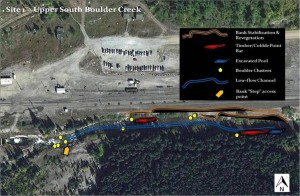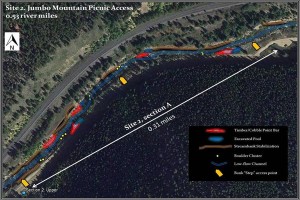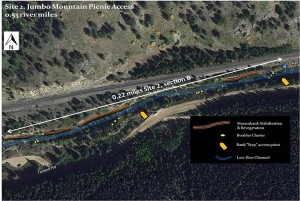Earlier this year, after a long-standing dispute over Denver Water’s proposed Moffat Collection System Project (Moffat Project), Trout Unlimited, Grand County and Denver Water have reached an agreement on how to protect the Fraser River and its tributaries from the project’s impacts.
Denver already diverts water - including an estimated 60 percent of the native flows of the Fraser - from the Fraser and Williams Fork basins through an extensive network of tunnels and pipes that funnel water to the Moffat Tunnel for delivery and use in the Front Range. Denver's proposed project would expand storage at Gross Reservoir and enable them to divert additional water from this network during comparatively wetter periods (generally spring and early summer, in wet and average years). The loss of these higher flow periods and the sediment flushing they provide, and the potential for summer diversions to exacerbate existing high stream temperatures, raise significant concern for TU and others concerned with the health of the Fraser basin. Above all, TU has been concerned that existing habitat models cannot properly predict impacts in a stream system that is already so depleted, and so we have consistently called for a monitoring and adaptive management program capable of detecting and addressing unanticipated impacts.
The agreement among Denver Water, Grand County, and TU responds to these concerns through an extensive package of enhancement and mitigation, guided by an ongoing monitoring and adaptive management effort called "Learning by Doing." Whether mitigation or enhancement, Denver Water commits to implement this package and that commitment would be included in the 404 permit for the project.
Learning by Doing (LBD) will be implemented by a committee that includes Grand County, Trout Unlimited, Denver Water, and Colorado Parks and Wildlife. The LBD Committee would implement an extensive monitoring program to assess stream health based on specific parameters including stream temperature, aquatic life, and riparian vegetation health. Water and financial resources committed by Denver Water (listed below) would be deployed to prevent declines and improve conditions where needed. Denver Water also commits to use flexibility in how it can operate its extensive water diversions system to help reduce impacts and where possible provide benefits to the streams. LBD would also be the vehicle through which mitigation measures imposed by the Corps would be implemented.The core concept is to dedicate substantial resources for mitigation and river enhancement, and then let future monitoring data help guide how to best apply those resources - so that river conservation efforts will be based on actual conditions, not on uncertain model results. And the program offers a path forward to not only address impacts from the proposed Moffat Project, but also to improve existing stream conditions.
So what are the resources Denver will provide to help the Fraser and Upper Colorado river basin? Here's a brief summary:
Mitigation Measures include:
(1) Measures to address stream temperature issues:
- Monitor stream temperatures and bypass up to 250 AF of water annually if stream temperatures reach or exceed state standards
- Bypass sufficient additional flows to reach defined minimum flows if stream temperature problem persists after the 250 AF have been bypassed
- If temperature problems persist, contribute $1 million to LBD for additional projects to help reduce temperatures (such as riparian re-vegetation and channel improvements)
(2) Measures to address sediment/flyshing flow issues:
- Using flexibility in Denver's system operations, work to provide flushing flows as recommended under Grand County’s Stream Management Plan
- Operate and maintain sediment pond that catches highway traction sand
- If sediment problems persist, contribute $1 million to LBD for additional projects to help reduce sedimentation (such as channel improvements to facilitate sediment flushing)
(3) $750,000 for fish habitat restoration projects
(4) $72,500 for fish barrier and restoration of cutthroat habitat, plus any additional measures required by the US Fish and Wildlife Service in its Biological Opinion
Enhancement Measures include:
(1) Through LBD, implement an extensive monitoring program including stream temperature, sediment transport, benthic macroinvertebrates, and riparian areas and wetlands
(2) 1000 AF of water each year released from Denver Water’s Fraser collection system for the benefit of Fraser basin streams (guided by LBD and presumably during key low-flow periods)
(3) 1000AF of water each year released from Williams Fork reservoir (including up to 2,500AF of storage) for the benefit of the Colorado River below its confluence with Williams Fork
(4) Use Denver Water’s system operation flexibility (ie, retiming/reoperating their diversions) to address identified problems while maintaining water yield
(5) $3.75 million for aquatic habitat improvement projects ($1.25 million available before the Gross enlargement is built)
(6) $1 million to pump water at Windy Gap to Granby for release for the benefit of the Colorado River below Granby and below Windy Gap Reservoir
(7) $2 million for stream improvement projects in the Colorado River
(8) $1 million for the Colorado River Wild and Scenic Stakeholder effort in the Colorado River
(9) $2 million for water quality projects (available before the project is built)
(10) Provide in-kind contributions of people, equipment and material to benefit LBD
These are significant resources to benefit river and watershed health, especially as they will be applied based on a data-driven monitoring and adaptive management program in which multiple stakeholders, including TU, have a full voice. If for any reason LBD were to cease functioning, Denver Water commits to continuing to implement these measures through an alternative process that would be approved by the Army Corps of Engineers. To guarantee the enforceability of these commitments, Denver Water has asked that they be included as a term and condition of its Clean Water Act 404 permit for the Moffat Project. Inclusion of this “fail-safe” permit condition is critical to the agreement. Without it, Trout Unlimited cannot support either the agreement or the Moffat Project.
Trout Unlimited has fought long and hard to protect the Fraser River basin streams. The new agreement not only provides the tools needed to protect and even improve stream conditions, but it also puts Trout Unlimited in a position to influence their future. With that opportunity, we recognize an ongoing responsibility as well. Reaching this agreement (and next, ensuring its inclusion in the Moffat Project's permits) is a major milestone, but only the beginning for the real work ahead of saving the Fraser.













